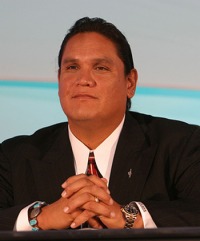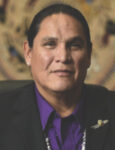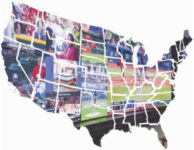
As Indian Country confronts the economic crisis, it is empowering to see the strength of tribal governments as they tackle issues ranging from the threat of increased federal regulation to meeting the basic needs of their communities. It has been through the hard work and the dedication of the tribal leaders throughout Indian Country that Indian gaming will be poised to lead us out of this economic crisis with a renewed sense of optimism.
In just 20 years, Indian gaming has grown into a stable, professional and responsible industry that generates vital resources and jobs that were not previously available. This is attributable solely to the hard work and innovation of our tribal governments. It should never be forgotten that when Congress passed IGRA it was at the urging of the states that wanted to reduce tribal sovereignty. Despite IGRA, tribal governments succeeded and fostered an industry with over $26 billion in revenue and accountable for over 700,000 jobs nationwide. Now more than ever, tribal governments need to call on their resourcefulness and innovativeness once more to tackle and weather this current economic crisis. In addition, Indian Country must continue to come together and foster change for all and develop effective partnerships that will deliver federal policies in the spirit of tribal sovereignty and tribal self-governance, along with a renewed regulatory outlook.
Tribal Governments and the New Administration-Forging a New Path Forward
A new congressional leadership has taken office and President Obama has begun aggressively pursuing his agenda. From the beginning, President Barack Obama has expressed his commitment to deal with tribes on a government-to-government basis. Tribal governments should now put the president’s words into action.
Indian Country is calling upon President Obama to issue a new executive order requiring federal agencies to consult with tribal governments on all regulations that impact tribal operations. The last executive order on tribal consultation was issued by President Clinton in 2000 and is in desperate need of updating. Thanks to the growth tribes experienced in the last nine years, tribal operations can now be impacted by federal regulations that were never even intended to apply to tribes. These types of regulatory intrusions can be solved through government-to-government consultation with tribal leadership. Some of Indian Country’s biggest challenges have been from government agencies and their lack of effort to consult with tribal governments and meet with tribal leaders in a meaningful and respectful manner.
I am confident that President Obama was sincere in his campaign pledges to Indian Country and that this will translate into a federal policy that all government agencies are required to enact. However, we need tribal governments to contact not only the White House, but also their congressional representatives and let them know that Indian Country is awaiting this important policy initiative.
At NIGA, we helped push for the introduction of House Bill 5608, which will statutorily require federal agencies to consult with tribal governments. This legislation is necessary because unfortunately, we have seen federal agencies intent on regulating a problem into existence, rather than evaluating if there was a problem at all.
I believe that NIGA, along with the National Congress of American Indians, National Indian Education Association, National Indian Health Board and other Indian organizations, can capitalize on achieving a respectful dialogue with the federal government. A lot of our challenges over the next four years will be something we can work to solve, as opposed to battling with a federal agency to prevent an unwarranted solution.
The Current Federal Regulatory Environment
Forging a new regulatory partnership between tribes and the federal government is certainly needed after the National Indian Gaming Commission had one of its busiest regulatory agendas in recent years. In 2008 alone, the NIGC sought to finalize four new Class II gaming regulations that would have negatively impacted Indian Country. They also proposed to redefine the definition of “sole proprietary interest” under IGRA, and finally, they passed regulations requiring tribes to submit paperwork on the trust status of their own lands.
In 2009, we can expect the NIGC to again address several issues important to Indian Country. However, Indian Country wants to see a new NIGC chairman at the helm who will implement the tribal consultation policies initiated by the president. We thank Chairman Phil Hogen for his service, but his original three-year term expired in December 2005. The Indian Gaming Regulatory Act allows for the commissioner to serve past his three-year term until a successor has been named, which we have asked President Obama to do this year.
The important position of general counsel at the NIGC has also remained unfilled for a number of years. Indian Country and the Indian gaming community will call upon the Obama administration to fill that position as well. Indian Country must demand an NIGC that is a partner in regulation. We hope that the Congress will appoint associate commissioners who share Indian Country’s desire to negotiate on regulatory initiatives and mandated from above.
Class II Regulations
Last year, with the assistance of our member tribes and regional gaming associations, NIGA coordinated an effort to oppose the NIGC’s overreaching Class II definition and Class II classification regulatory proposals. The NIGC’s new regulations would have overturned hard-fought federal court victories by Indian Country in defense of Class II gaming.
In a big victory for Indian Country, the NIGC officially withdrew those regulations in October. The NIGC officially withdrew their proposed Class II classification standards and changes to the definition of “electronic or electromechanical facsimile.” NIGA and Indian Country had long voiced their opposition to these two proposed regulations. Indian Country’s opposition only increased when the NIGC released an economic impact report detailing the dire economic consequences for Indian Country if these regulations became law.
By convincing the NIGC to withdraw the classification and definition regulations Indian Country achieved a great victory in defending the Class II industry. Our congratulations go out to all those tribal leaders who helped fight these regulations over the past two years.
However, the NIGC still went ahead and published Class II Technical Standards and MICS. We have asked that the Obama administration, along with the new NIGC chairman, bring these issues back to Indian Country for further consultation.
Tribes continue to be unhappy with the Class II Technical Standards and MICS. The game-recall provisions of the proposed technical standards require the player interface to display results of any alternate display. This requirement confuses the reality of the game and may obscure the distinction between the legal relevance of a bingo game and any alternate entertaining display. More consultation with tribal governments is needed to resolve these outstanding issues. Only then would these regulations be ready for final publication.
Last-Minute Regulatory Changes By The NIGC
On December 22 the National Indian Gaming Commission published in the Federal Register proposed rule changes. The proposed rule seeks to modify “various commission regulations to reduce reporting burdens on tribes, update costs for background investigations, clarify definitions and regulatory intent, and update audit requirements to consolidate and reflect industry standards.” Many of these proposed rule changes were initially released as drafts by the NIGC in 2006. These rule changes have not been priority for the NIGC and the NIGC has not engaged in dialogue with tribal governments since their initial debut.
President Bush’s OMB director directed federal agencies to stop issuing agency regulations on November 1. President Obama’s chief of staff directed agencies to stop issuing regulations unless an Obama appointee had reviewed them on January 20. The NIGC failed to follow either of these presidential directives and Indian Country must demand that the NIGC withdraw the proposed rule changes.
While some of the proposed changes are minor, tribes have strongly objected to the proposed rule changes to the statutory definition of “net revenue.” Any NIGC regulation on this definition should conform to the statutory definition under IGRA. By striking the word “gaming” from the definition, the NIGC is seeking to include non-gaming revenue in the calculation of net revenues, such as hospitality revenue generated at a casino-resort complex. This would clearly not be consistent with IGRA. Instead, the NIGC should stay closer to the statutory language mandated by Congress in IGRA: “The term ‘net revenues’ means gross revenue of an Indian gaming activity less amounts paid out as, or paid for, prizes and total operating expenses, excluding management fees.”
There should be courtesy between the outgoing and incoming presidential administrations. The responsibility of amending existing federal regulations belongs to the incoming commission that will be appointed by President Obama and BIA Secretary Ken Salazar. This is why it is important that Indian Country deliver the message to President Obama that the NIGC should not finalize any rules until a new chairman and a new associate commissioner are appointed.
Consultation
Last year’s NIGC activity highlights the fact that there must be a new partnership between tribes and the federal government in implementing and carrying out federal regulations. Indian Country must seek a consultation process where tribal representatives are active participants from the beginning in deciding whether federal regulation is needed or if tribal law processes are the more responsive avenues for effective regulation. Indian tribes must have a more active role not only in providing advice and input, but also in the drafting process itself.
President Obama has promised at least this much and tribes must begin this process with his administration. We feel that tribal governments, as the first-line defenders of Indian gaming, have a strong track record of experienced professionals and top-notch regulation. In 2008 alone, tribal governments spent over $375 million on regulation. Tribes realize that the benefits of Indian gaming would not be possible without good regulation. Successful operations require solid regulation and tribal governments will match their history of regulation against that of any state or local government.
This system is costly, it’s comprehensive, and it has a proven track record of success. We need the Obama administration to work with and consult tribal governments so that we may improve upon the success of regulatory systems and the current state of tribal-federal relations.
In 2009, we again expect to spend a great deal of our time and effort defending the success of our industry from unnecessary regulatory interference. However, given the economic stake that states and local communities and business leaders now have in the success of Indian gaming, I see a new opportunity for regulatory cooperation. Our tribal leaders are open to consultation and the development of new regulations when they are needed.
NIGA will continue to defend tribal sovereignty and any attempts to open up IGRA to amendments. However, it is my hope that with a new administration, we really can change the way the federal government does business and we can put to rest the adversarial stances of the past and engage in a new era of cooperation and mutual understanding.


















